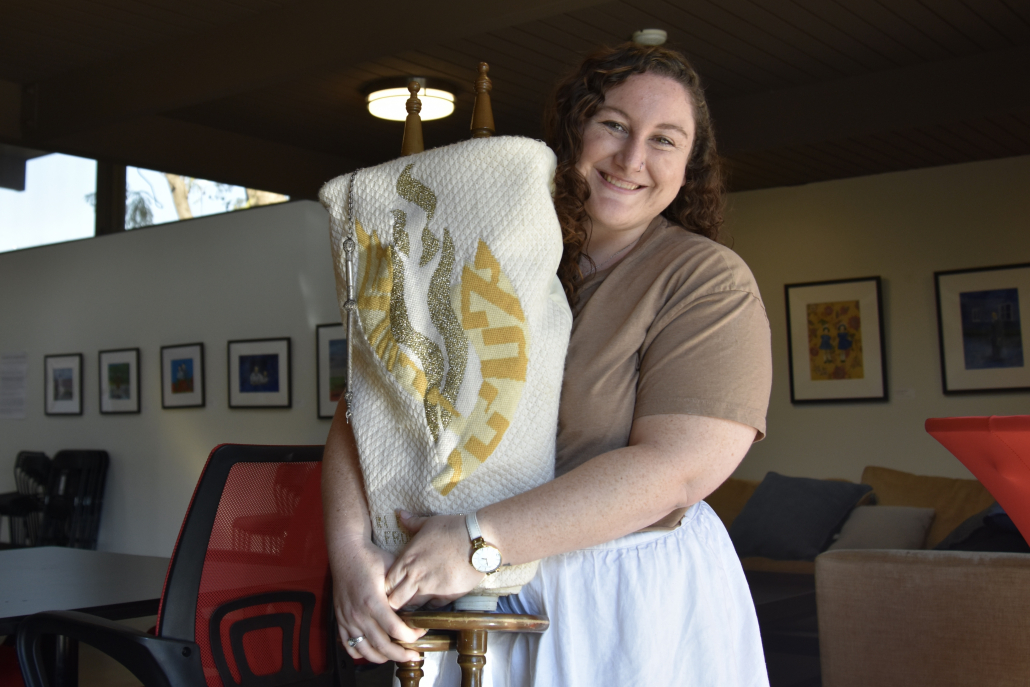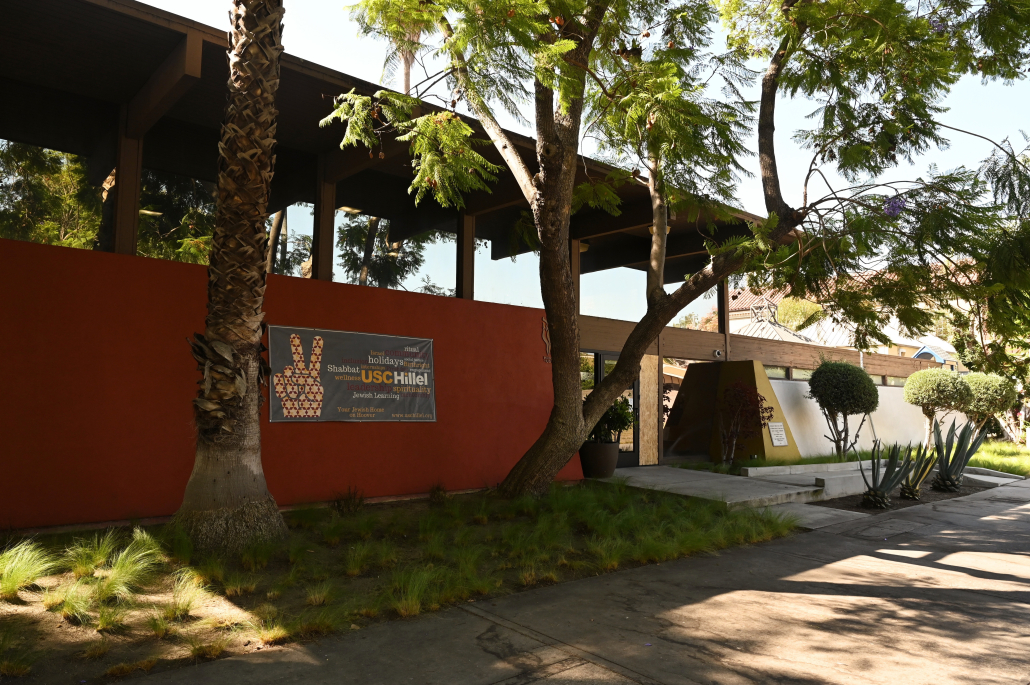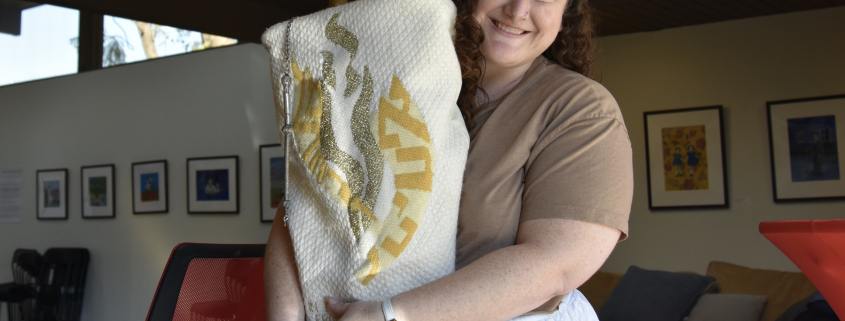Miriam Hoffman: A queer voice at USC Hillel

Miriam Hoffman finds that she doesn’t often have to think about being queer or Jewish. Those identities are just natural to her, she said.
“My queerness is part of me, but it’s not something that I’ve ever separated from myself to think about in its own context,” she said. “I am Jewish. I am queer. I don’t think about these things in very distinct kinds of ways.”
Hoffman, USC Hillel’s rabbinic intern, decided she wanted to be a rabbi at a time when there were no other Jews around her. She originally wanted to be a therapist when she entered college, but when she studied in Spain during her junior year she found a sudden absence of Judaism that tugged at her heartstrings.
“I have been surrounded by Jews and Judaism my whole life,” Hoffman said. “My mom became a rabbi when I was in high school. I went to Jewish day school through sixth grade. I went to Jewish summer camp for 15 years … In college, I got involved with Hillel and Chabad on my campus at the University of Arizona.”
As a solution to her loneliness, Hoffman took a train to Madrid one weekend and stayed at the city’s Chabad, where she observed Shabbat and found good company with other Jews for the first time in a while.
“It made my heart happy in a way that it hadn’t been since I had been in Spain,” Hoffman said.
Afterward, Hoffman consulted with her mother and academic advisor and landed on a new career path. She became an Avodah Social Justice Corps Member in New York and spent her first year of rabbinical school in Israel before returning to the United States and attending the Hebrew Union College-Jewish Institute of Religion. Prior to interning at USC, Hoffman spent two years as the only rabbi at a small Reform Jewish congregation in Temecula.
Hoffman said she came to intern at USC Hillel because she knew working with students and Judaism simultaneously piqued her interest, but did not want to commit to it as a full time job at the moment. Her time at USC changed that perception. Hoffman will begin her work at Brandeis Hillel this summer.
“[Working at USC Hillel] has just been the most incredible experience that I got to sort of taste before fully committing,” she said, “and it was beautiful.”
Dave Cohn, USC Hillel’s executive director, said he greatly values Hoffman’s contributions to the organization, especially her interactions with the students who frequent it.
“She’s been genuinely a gift to Hillel,” Cohn said. “[Hoffman’s] authenticity and ownership of her own identity, her own wrestling with Jewish practice, her own grappling with tradition and modernity and all the different ways in which she journeys as a Jewish person … has attracted people to her and has invited students of every identity to feel comfortable learning with her.”
For Hoffman, the draw to Hillel was that ability to help students — many of whom will be having very important life experiences during their college years, she said.

“[College] is such a unique age and stage in someone’s life,” Hoffman said. “So, many students are away from home for the first time and are often coming to Judaism on their own for the very first time … And they are encountering Jews of all different backgrounds and Jewish traditions in ways that they never have before.”
Hoffman said her time with the Chabad at Arizona was integral to expanding her knowledge of Judaism and Judaic texts, and she wants other Jewish college students to be able to go through such an experience if they so choose.
“[Hillel] is a very unique place to foster that leadership and to foster that change in an individual so that they can go out and expand it on their own,” she said.
Ariela Moel, a freshman majoring in legal studies, said Hoffman has been a prominent part of her Hillel experience so far — Moel has risen to numerous leadership roles within the organization in her first year at the University.
“[Hoffman] has been a very open person about who she is,” Moel said, “which is very helpful for a lot of students who might not feel Jewish enough or might not feel Jewish themselves, and she’s helped a lot of people find their place in Judaism.”
Hoffman recalled her experience going to the “Slay-der” — a play on “Seder,” the ceremonial Passover meal — that USC Hillel’s Nice Jewish Queers, the organization’s queer affinity club, held on the second night of Passover. The meal gave her the same type of heartwarming joy as she did back at the Chabad in Madrid, she said.
“It was just full of joy and acceptance and shared experience, even if the experiences weren’t necessarily the same,” she said. “There was something connecting everybody in that moment … When you enter a queer space, there’s something shared and there’s something holy about that that is sort of ineffable. I don’t really know how to describe it, you just feel it.”
Hoffman said the intersection between her queer and Jewish identities heavily influences the way that she interacts with life, religious texts and her job.
“Even though some of our texts are challenging and … interpreted in homophobic ways, it’s really important for us to find ways to make those texts relatable and understandable or deal with them in ways that are authentic and holistic for our Jewish and queer identities,” she said.
Most importantly, Hoffman said, these identities help her and her fellow queer rabbis create spaces for students of the same dual identity.
“My only goal in life is to help people find their path into Judaism,” she said. “I really hope that includes queer people because I know how much Jewish texts and Judaism and other Jews can push away queer folk, and I really want to be somebody who brings people back in and says, ‘This is for you’ … That’s all I want to do.”

